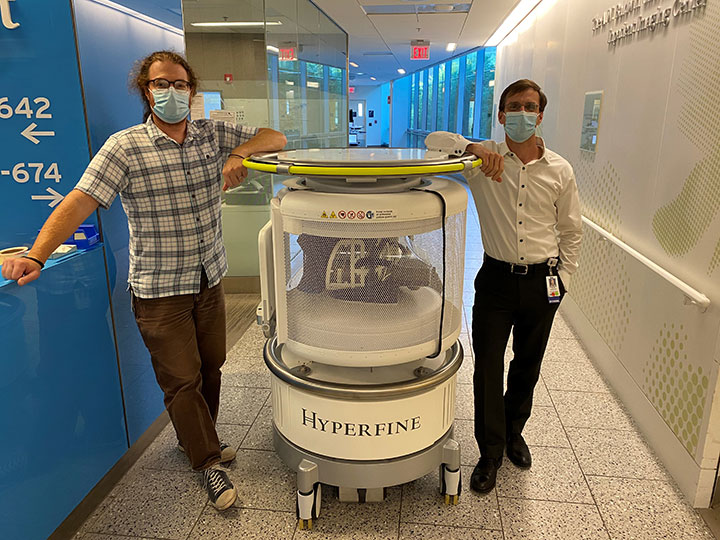Portable MRI Device Brings Imaging to the Battlefield and Bedside

A new portable magnetic resonance imaging (MRI) device will allow health care providers to bring brain imaging technology to hard-to-reach places, potentially speeding medical diagnosis and treatment for Service Members and the public. The highly portable device transports easily to the bedside of critically ill patients, expanding the availability and access of MRIs to field-based applications. The U.S. Department of Defense (DOD) — funded research that began in 2010, led to the new product's development.
Dr. Matthew Rosen of Harvard University, Harvard Medical School, and the Massachusetts General Hospital's Martinos Center for Biomedical Imaging received funding from the Congressionally Directed Medical Research Programs (CDMRP) in Fiscal Year 2010. He assembled a team of physicists and engineers to re-examine every aspect of MRI physics, signal acquisition, and image processing to create a device that would operate safely and effectively on a battlefield. Since a significant safety threat is the presence of undisclosed magnetic shrapnel, the team's challenge was to enable a diagnostic-quality MRI at ultra-low magnetic field.
"The motivation for my Defense Medical Research and Development (DMRDP)/CDMRP work is really simple —how do we bring the gold-standard of non-invasive neuroimaging (MRI) into theater to triage mild TBI (mTBI) in warfighters," said Dr. Rosen.
As the team's work advanced, it became clear that a portable system would also have applications for treating TBI patients in other medical settings. "Technologies for medical diagnostics have been rapidly evolving over the past decade and present unique opportunities and challenges in delivery of care," said Dr. B. Christie Vu, Program Manager, CDMRP. "While the clinicians may be able to assess patient symptoms faster or with more informative detail, logistical considerations such as cost, physical footprint, and competing clinical resources, may limit the availability of adoption of technology-based tools in clinical practice. This challenge is amplified the further away you move from large hospital settings, such as community care clinics or military field hospitals. Thus, there is significant interest in pursuing research that could lead to opportunities to deliver care further out into the community setting or closer to the point of injury."
Following the completion of the DOD funding, Dr. Rosen co-founded Hyperfine Research, Inc. to translate the initial research into development of the Swoop™, a device that does not require the cryogenic resources needed by high-field electromagnets. The low-magnetic field means the MRI can be used for patients with imbedded metal (such as medical devices or shrapnel) who may not be able to undergo traditional MRI. It can be plugged into a standard 110 volt, 15-amp outlet, making it easy to set up in different locations. It received U.S. Food and Drug Administration (FDA) clearances earlier this year.
The Swoop™ is currently being used in ICU settings, including with COVID-19 patients who are fully ventilated. According to Dr. W. Taylor Kimberly, chief of Neurocritical Care at Massachusetts General Hospital, the portable MRI was the centerpiece of a study to demonstrate the feasibility of bedside-neuroimaging in critical care settings. The study included 50 patients at Yale New Haven Hospital ICU, 20 of whom were infected with COVID-19. Bedside MRI imaging was able to detect neuroimaging abnormalities in nearly all of the non-COVID-19 patients and eight of 20 patients with COVID-19.
"Critically ill COVID-19 patients can sometimes remain intubated, sedated and paralyzed for days at a time. Neurological assessments are not possible in that setting, and yet, neurological complications such as stroke can occur. A portable MRI that is brought to the bedside can be helpful for diagnosis in these scenarios. The potential implications also extend beyond the ICU, and in other arenas where access to neuroimaging is limited, but timely diagnosis is important," said Dr. Kimberly.
Advances in research and technology can shift the paradigm from bringing patients to specialized hospital facilities for advanced diagnostics to bringing the technology to the patient. Portability of this device has increased the accessibility of neuroimaging in civilian clinical settings. The portable MRI was effective in treating COVID-19 patients at this critical time. Researchers and advanced developers will continue to explore the utility of field-based MRI with patients in military, on and off the battlefield, and other civilian environments.
 An official website of the United States government
An official website of the United States government
 ) or https:// means you've safely connected to the .mil website. Share sensitive information only on official, secure websites.
) or https:// means you've safely connected to the .mil website. Share sensitive information only on official, secure websites.


